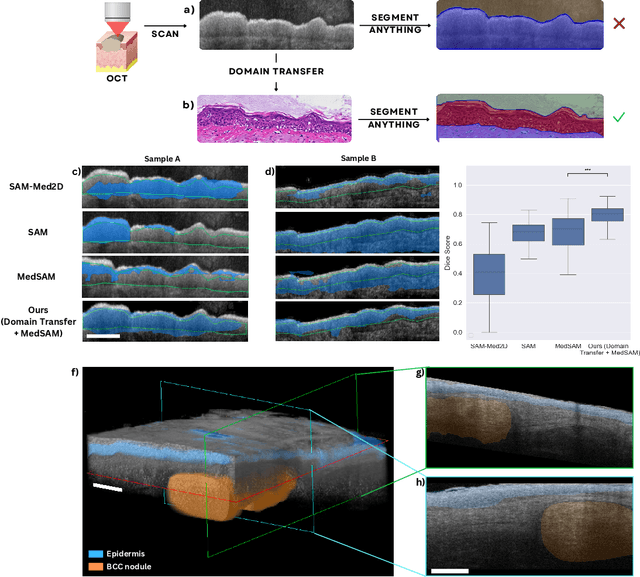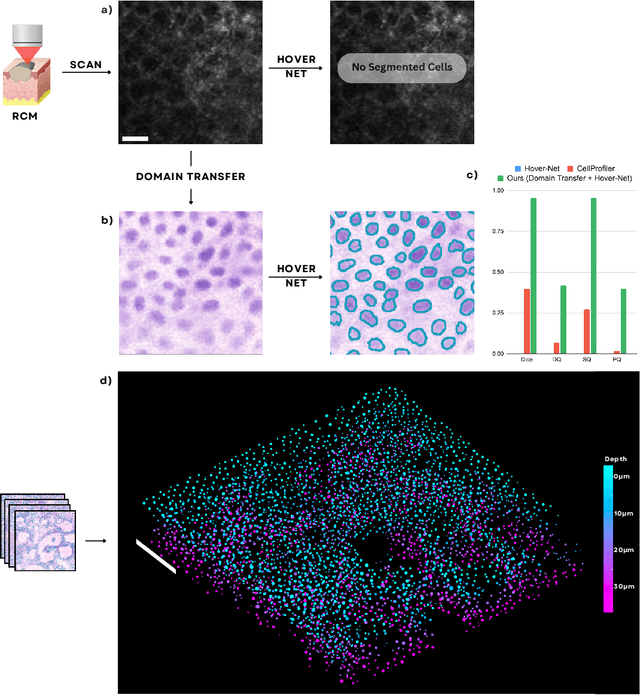Kavita Y. Sarin
Leveraging Computational Pathology AI for Noninvasive Optical Imaging Analysis Without Retraining
Nov 19, 2024

Abstract:Noninvasive optical imaging modalities can probe patient's tissue in 3D and over time generate gigabytes of clinically relevant data per sample. There is a need for AI models to analyze this data and assist clinical workflow. The lack of expert labelers and the large dataset required (>100,000 images) for model training and tuning are the main hurdles in creating foundation models. In this paper we introduce FoundationShift, a method to apply any AI model from computational pathology without retraining. We show our method is more accurate than state of the art models (SAM, MedSAM, SAM-Med2D, CellProfiler, Hover-Net, PLIP, UNI and ChatGPT), with multiple imaging modalities (OCT and RCM). This is achieved without the need for model retraining or fine-tuning. Applying our method to noninvasive in vivo images could enable physicians to readily incorporate optical imaging modalities into their clinical practice, providing real time tissue analysis and improving patient care.
Can Artificial Intelligence Generate Quality Research Topics Reflecting Patient Concerns?
Nov 15, 2024

Abstract:Patient-centered research is increasingly important in narrowing the gap between research and patient care, yet incorporating patient perspectives into health research has been inconsistent. We propose an automated framework leveraging innovative natural language processing (NLP) and artificial intelligence (AI) with patient portal messages to generate research ideas that prioritize important patient issues. We further quantified the quality of AI-generated research topics. To define patient clinical concerns, we analyzed 614,464 patient messages from 25,549 individuals with breast or skin cancer obtained from a large academic hospital (2013 to 2024), constructing a 2-staged unsupervised NLP topic model. Then, we generated research topics to resolve the defined issues using a widely used AI (ChatGPT-4o, OpenAI Inc, April 2024 version) with prompt-engineering strategies. We guided AI to perform multi-level tasks: 1) knowledge interpretation and summarization (e.g., interpreting and summarizing the NLP-defined topics), 2) knowledge generation (e.g., generating research ideas corresponding to patients issues), 3) self-reflection and correction (e.g., ensuring and revising the research ideas after searching for scientific articles), and 4) self-reassurance (e.g., confirming and finalizing the research ideas). Six highly experienced breast oncologists and dermatologists assessed the significance and novelty of AI-generated research topics using a 5-point Likert scale (1-exceptional, 5-poor). One-third of the AI-suggested research topics were highly significant and novel when both scores were lower than the average. Two-thirds of the AI-suggested topics were novel in both cancers. Our findings demonstrate that AI-generated research topics reflecting patient perspectives via a large volume of patient messages can meaningfully guide future directions in patient-centered health research.
 Add to Chrome
Add to Chrome Add to Firefox
Add to Firefox Add to Edge
Add to Edge